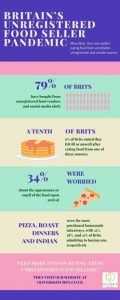19 Jul 2021 Stranger Danger: Buying Food from Social Media Sellers Is A Food Health & Safety Risk
The rise of the “social media chef” is leaving UK consumers at risk from harm by food health and safety blunders. The worrying trend that was born during the UK COVID lockdowns puts people at risk from pathogens and allergens due to a lack of regulation and health and safety training.
With so many people losing their livelihoods and finding they had more time on their hands during the pandemic, true British entrepreneurial spirit prevailed and people looked at ways to boost their depleted income. Taking advantage of changes to consumer behaviour and market needs, many pop-up home-based food delivery businesses appeared on our social media platforms. Capitalising on people being stuck at home during the Coronavirus restrictions, people turned their home kitchens into takeaway businesses and sold their wares on Facebook, Snapchat and Gumtree.
Figures from the Food Standards Agency (FSA) and an online registration system used by nearly 200 local authorities shows 44 per cent of food businesses started since the first pandemic lockdown are home-based.
A survey by kitchen and cookware business Oliver’s Kitchen revealed that almost 80% of Brits have tried one of these so-called social media chefs during the lockdown period.

Source: Oliver’s Kitchen
What food health and safety risks are there with a home-based food business?
The law is clear that food safety legislation must be followed by all food establishments and that home-based food businesses are no exception. If anything, kitchen environments that are not deliberately designed for commercial food preparation have potentially more dangers and pitfalls than purpose-built premises.
What seems like a good news story to come out of sad and turbulent times isn’t as positive if you look beneath the surface. Sadly, 34% of people who had bought from home-based food businesses had concerns about their food when it arrived, and 10% of people experienced sickness or diarrhoea as a result of their orders.
Oliver Warburton, founder of Oliver’s Kitchen: “With people spending more and more time indoors, unable to go to their favourite restaurants, it’s no wonder that so many have turned to unregistered vendors selling unique and bespoke homemade meals. However, I was surprised to see how many people were unaware that every food establishment should have a hygiene rating by law!
“It’s a growing trend at the moment, but unfortunately it doesn’t come without its risks. We really do urge people to ensure they know where they are buying their food from, because a nasty spout of food poisoning isn’t fun for anybody, and in serious cases, it can be very dangerous.”
More than a third of respondents to the survey were not aware that food businesses, even casual ones, were required by law to undergo safety/hygiene checks. Many of the pop-up takeaways won’t be aware of this either, which is why the Food Standards Agency describes the trend as “very concerning”.
What does the law say about food health and safety for at-home food businesses?
When setting up a food-related business, by law business owners must register with their local authority and have a Food Hygiene Inspection take place where the food is prepared. There are many food health and safety standards that must be adhered to, which often are not naturally in place in residential kitchens. Food businesses must also by law use HACCP measures or a HACCP-based Food Safety Management System.
We doubt that many casual delivery service proprietors are fully versed in the ins and outs of food health and safety, which leaves the British public at risk of great harm from pathogens or from allergens from this unregulated food industry.
Allergen awareness training saves lives
As the UK prepares for Natasha’s Law coming into force this October, Tanya Ednan-Laperouse, the founder of Natasha’s Foundation, said the emergence of tens of thousands of at-home and dark kitchens during the COVID-19 pandemic raises fears about food safety, particularly for the two million-plus people in the UK who have food allergies.
A lack of allergen and pathogen awareness can have deadly consequences. Although takeaways are considered like restaurants that make food to order and therefore aren’t affected directly by Natasha’s law, they are required to list all ingredients and potential allergens and have this information available at both the point of sale and delivery.
Food Health & Safety training is essential
Food Health and Safety and Allergen Awareness training is an essential part of any new food business’s strategy. So many people think that all it takes to run a successful food business is to prepare delicious food that people enjoy eating – unfortunately, there’s a lot more responsibility involved than many realise.
As all Covid restrictions are due to be lifted imminently, it will be interesting to see how the market responds and how many of these pop-up takeaways continue to trade as we readjust to life after COVID.
At Magna FHS we are passionate about keeping UK consumers safe and protecting businesses from falling foul of UK Food safety regulations. Check out our full list of Food Health & Safety and Allergen Awareness training courses and available dates here.










